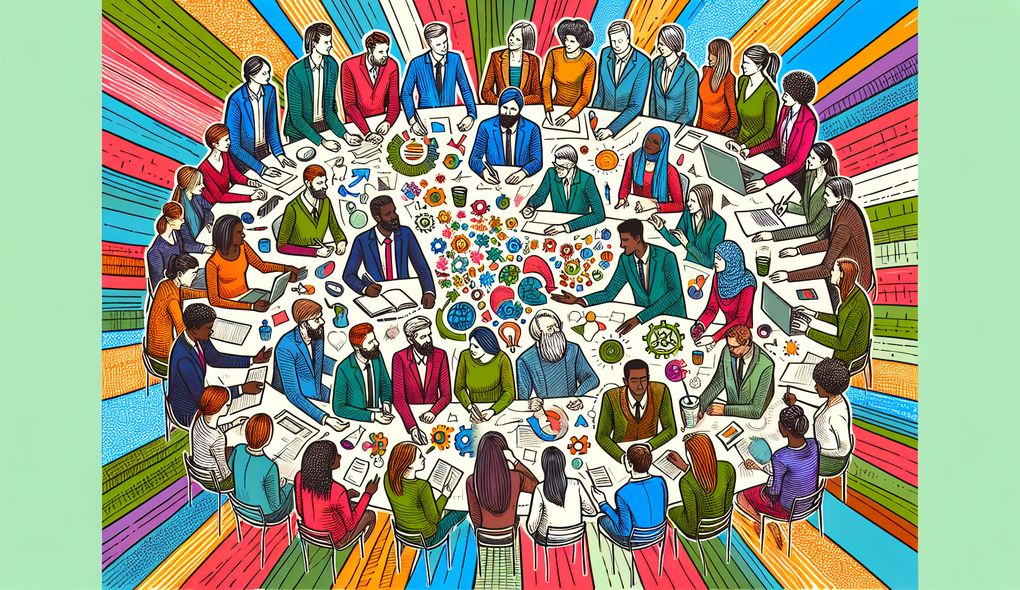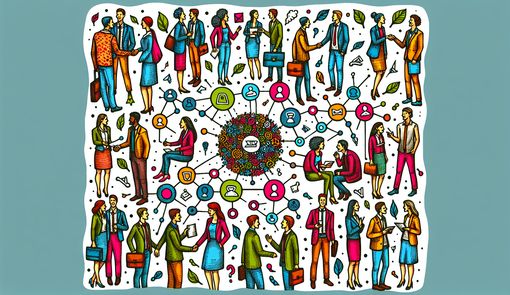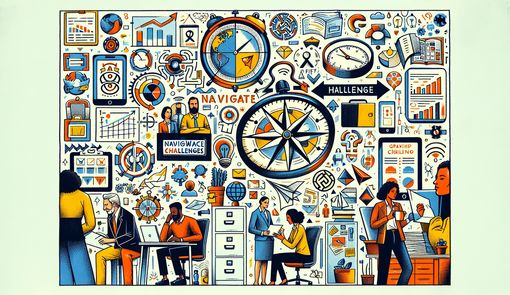The Importance of Workforce Diversity and Inclusion in Career Growth
Explore the significance of a diverse and inclusive workforce for individual and organizational career advancement.

Promoting a diverse and inclusive work environment is more than just a trendy HR buzzword; it is a significant factor that contributes to the growth and success of both individuals and organizations. Workforce diversity refers to the representation of a wide range of traits and experiences in a company's employee population, including but not limited to gender, race, ethnicity, age, sexual orientation, religion, and disability. Inclusion, on the other hand, is the practice of ensuring that all employees feel valued and are given equal opportunities to contribute and advance in their careers.
The Significance of a Diverse Workforce
A diverse workforce brings together individuals from different backgrounds, each with unique perspectives and skills. This amalgamation can lead to more creative solutions to problems, innovation in products and services, and a better understanding of a global customer base - all of which are crucial for an organization's competitiveness in today's market. Companies that prioritize diversity are also more likely to attract top talent from various demographics, as job seekers often look for employers who demonstrate cultural competency and inclusivity.
Benefits for Individuals
For employees, working in an environment that values diversity can be incredibly empowering. It means that no matter what your background is, you have an equal shot at success. Diversity initiatives can help to breakdown stereotypes and biases, allow for a wider range of mentoring and networking opportunities, and expose individuals to different ways of thinking and problem-solving. All of these factors contribute to personal growth and career development.
Benefits for Organizations
From an organizational standpoint, diversity drives business growth. It enhances brand reputation, aids in attracting a diverse customer base, and facilitates global market penetration. Diverse teams have been shown to avoid groupthink, making them more effective at decision-making. Moreover, companies that reflect societal diversity are often viewed more favorably, which can influence customer choices and loyalty.
The Role of Inclusion in Career Growth
While having a diverse workforce is essential, without inclusion, the benefits can be limited. An inclusive workplace is one where individuals feel respected and valued for who they are and know that their contributions matter. It involves creating an environment where everyone can thrive regardless of their differences. Inclusive companies promote equity, where career advancement is based on merit and not impacted by unconscious bias.
Career Advancement through Inclusion
Inclusion directly influences career advancement. Employees who feel included are more engaged with their work, perform better, and are more likely to stay with a company. When workers believe that promotions and professional growth opportunities are distributed fairly, motivation and job satisfaction increase. An inclusive culture also encourages employees to step outside their comfort zones, leading to expanded skills and competencies that pave the way for advancement.
Fostering an Inclusive Culture
Companies with inclusive cultures often provide comprehensive training on diversity and unconscious bias, establish mentorship programs that support underrepresented groups, and create platforms for open communication. Offering flexible work arrangements can also support inclusivity by accommodating different lifestyles and obligations outside of work. Leadership commitment is crucial; leaders must be role models for inclusion, demonstrating through their actions that they value a diverse set of voices and contributions.
Challenges and Barriers
Despite the known benefits, achieving true diversity and inclusion can be challenging. Common barriers include unconscious biases, resistance to change, and systemic inequalities that exist in society. Organizations must actively work to identify and remove these barriers by re-evaluating their hiring practices, fostering an inclusive work culture, and continuously educating their workforce on the importance of diversity.
The Future of Workforce Diversity and Inclusion
The future of employment is likely to be increasingly diverse and inclusive. As the global workforce becomes more interconnected and businesses continue to recognize the tangible benefits of a diverse work environment, there will be a growing emphasis on inclusion strategies. By embracing diversity and fostering inclusion, companies are not just doing the right thing ethically; they are also positioning themselves for long-term success and resilience.
In conclusion, workforce diversity and inclusion are pivotal components of career growth, benefiting both individuals and organizations. To thrive in a competitive, increasingly global market, companies must commit to creating a workspace where diversity is embraced and all employees are empowered to reach their highest potential. The future demands a concerted effort to weave diversity and inclusion into the very fabric of the workplace, ensuring that every employee has the opportunity to grow, contribute, and succeed.
Frequently Asked Questions
1. What is workforce diversity and inclusion?
Workforce diversity refers to the representation of a wide range of traits and experiences in a company's employee population, including gender, race, ethnicity, age, sexual orientation, religion, and disability. Inclusion, on the other hand, is the practice of ensuring that all employees feel valued, respected, and have equal opportunities to contribute and advance in their careers.
2. Why is workforce diversity important?
Workforce diversity is important because it brings together individuals with different backgrounds, perspectives, and skills, leading to more creative solutions, innovation, and a better understanding of diverse customer bases. It also helps in attracting top talent, improving decision-making, and enhancing brand reputation.
3. How does workforce diversity benefit individuals?
For individuals, workforce diversity offers empowerment through equal opportunities for success, breakdown of stereotypes, exposure to diverse perspectives, and expanded networking and mentoring opportunities. It contributes to personal growth, competency development, and career advancement.
4. What are the benefits of workforce diversity for organizations?
Organizations benefit from workforce diversity by driving business growth, attracting diverse customer bases, enhancing decision-making effectiveness, increasing brand reputation, and improving employee engagement and retention. Diverse teams promote innovation, creativity, and better problem-solving.
5. What role does inclusion play in career growth?
Inclusion is essential for maximizing the benefits of diversity. It ensures that all employees feel respected, valued, and have equal opportunities for professional growth. Inclusive cultures promote equity, fairness in promotions, increased employee engagement, and improved performance.
6. How can organizations foster an inclusive culture?
Organizations can foster an inclusive culture by providing diversity and unconscious bias training, establishing mentorship programs, promoting open communication, offering flexible work arrangements, and ensuring leadership commitment to inclusion. Creating an environment where everyone can thrive regardless of differences is key.
7. What are the challenges and barriers to achieving workforce diversity and inclusion?
Common challenges include unconscious biases, resistance to change, and systemic inequalities. Organizations need to actively address these barriers by re-evaluating hiring practices, promoting inclusivity, and educating employees on the importance of diversity.
8. What does the future hold for workforce diversity and inclusion?
The future of employment is expected to focus more on diversity and inclusion. As businesses recognize the benefits of diverse work environments and interconnected global workforce, there will be an increased emphasis on inclusion strategies. Companies embracing diversity position themselves for long-term success and resilience in a competitive market.
Further Resources for Workforce Diversity and Inclusion
Books
- "Diversity in the Workplace: Eye-Opening Interviews to Jumpstart the Unconscious Bias Conversation" by Bärí A. Williams. Link to Book
- "The Diversity Advantage: Fixing Gender Inequality in the Workplace" by Ruchika Tulshyan. Link to Book
Articles
- "The Business Case for Diversity in the Workplace" by Harvard Business Review. Link to Article
- "Why Inclusive Leaders Are Good for Organizations, and How to Become One" by Forbes. Link to Article
Websites
- Diversity Best Practices - Provides research, best practices, and leadership strategies for diversity and inclusion. Link to Website
- Catalyst - Offers resources and tools to build workplaces that work for women. Link to Website
Online Courses
- Diversity and Inclusion in the Workplace by LinkedIn Learning. Link to Course
- Unconscious Bias by Coursera - Understand and address unconscious biases in the workplace. Link to Course
Podcasts
- "The Culture Corner" - Explores diversity, equity, and inclusion in various industries. Link to Podcast
- "Inclusion Works" by Hive Learning - Delves into practical strategies for building an inclusive workplace. Link to Podcast

 Resume and Cover Letter Writing
Resume and Cover Letter Writing Interview Preparation
Interview Preparation Career Development
Career Development Networking and Personal Branding
Networking and Personal Branding Workplace Skills
Workplace Skills Job Search Strategies
Job Search Strategies Work-Life Balance
Work-Life Balance Salary Negotiation
Salary Negotiation Career Transitions
Career Transitions Navigating Workplace Challenges
Navigating Workplace Challenges Professional Growth
Professional Growth Trends in the Workplace
Trends in the Workplace